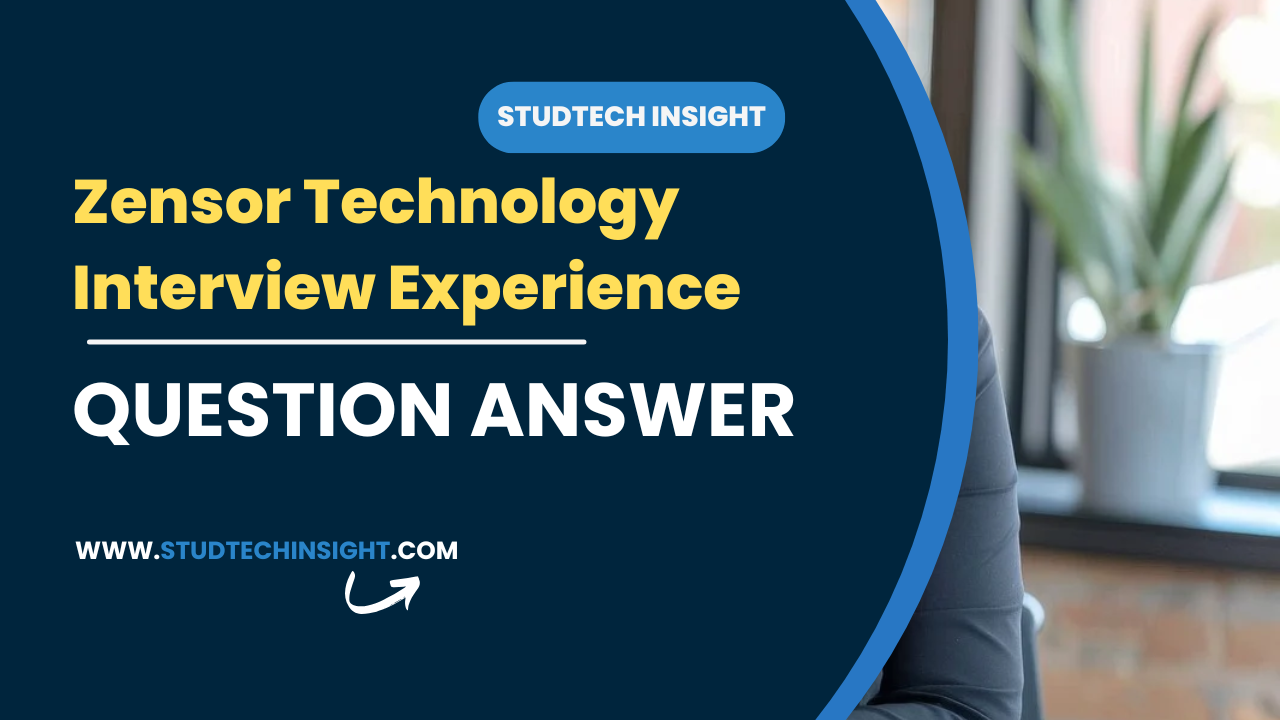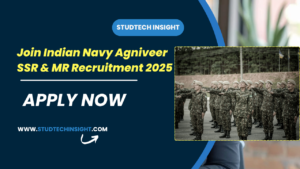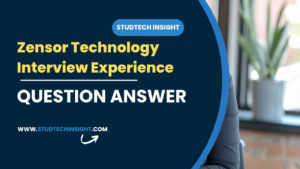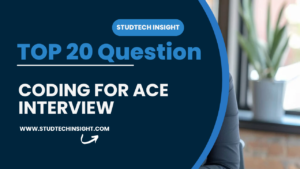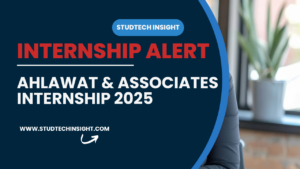Hey everyone! If you’re preparing for the Zensor Technology interview process, you’re in the right place! I recently went through their recruitment process, and it was both challenging and rewarding. From solving aptitude questions to cracking technical rounds, I’ll walk you through everything step-by-step. Let’s get started!
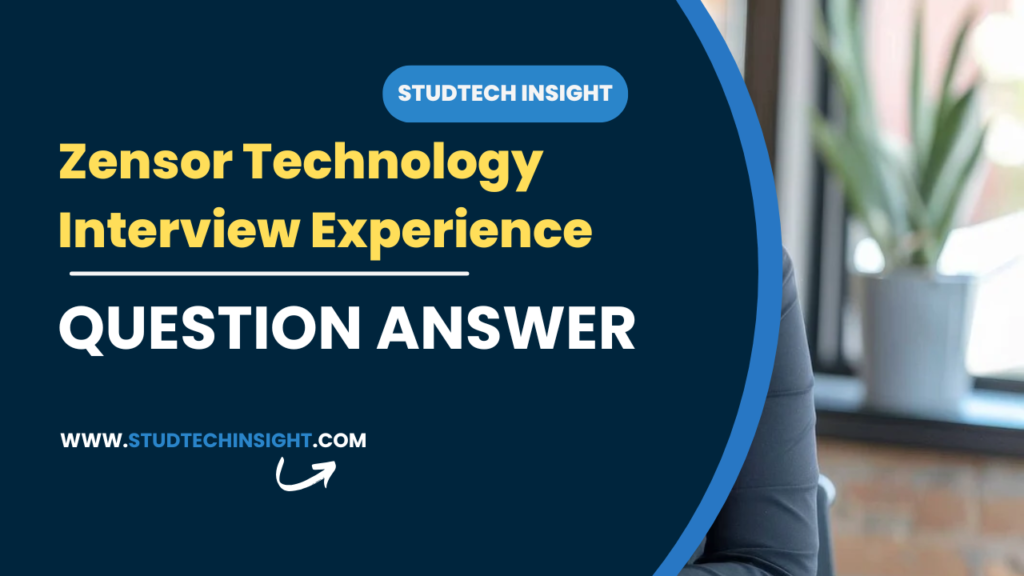
Round 1: Online Aptitude Test
Date: 16th September
Format: Conducted on a local area network with 54 questions.
Breakdown:
- Aptitude and Reasoning (30 Questions):
Topics included Age, Average, Series, Number System, Train Problems, Ratio, Allegation & Mixture. - Technical Knowledge (20 Questions):
Questions were based on Operating Systems, Networking, Java, JSP, and Fundamentals of Computer Science. - Programming and Database Queries (4 Questions):
- 2 MySQL queries involving joining tables and displaying results.
- 2 programming problems (language of choice: C, C++, or Java).
- One problem involved string manipulation (e.g., swapping letters for encryption).
- The other was related to printing vowels in a given string.
Key Takeaways:
- Time management is crucial. The test was extensive, and I had to prioritize questions I was confident about.
- Practicing SQL queries and string manipulation problems beforehand was a huge advantage.
Round 2: Group Discussion (GD)
Date: 16th September
Participants: 120 students selected out of approximately 750.
Group Size: 7-10 students per group.
Topic Given to Me: Strengths vs. Weaknesses
Other Topics: Happiness, Role of Emotions in Life.
How I Approached the GD:
- I started by saying that everyone has strengths and weaknesses, and what matters is how we use our strengths to overcome our weaknesses.
- I gave examples like how being good at communication (a strength) can help someone overcome shyness (a weakness).
- I also made sure to listen to others and add to their points, which I think the evaluators liked.
Key Notes:
- Communication and clarity of thought are essential.
- Listening to others and building on their points is just as important as presenting your own.
- Staying calm and confident helped me stand out.
Result: 75 students were selected for the next round.
Round 3: Technical Interview
Date: 17th September
Duration: 1 hour (first round), 30 minutes (second round for waiting candidates).
First Technical Interview:
- Introduction: I was asked to introduce myself and elaborate on my technical skills (Java, SQL, Oracle Forms).
- Questions Asked and My Answers:
- Why Java without C/C++?
- I explained that I started with Java because of its simplicity and widespread use in the industry. However, I later added C/C++ to my skillset to understand low-level programming.
- Networking Concepts:
- Subnet Mask: I explained it as a mask used to divide an IP address into network and host addresses.
- DNS Working: I described how DNS translates domain names to IP addresses and its hierarchical structure.
- IP Addresses and Classes: I explained the different classes (A, B, C) and their ranges.
- Java Concepts:
- Inheritance: I explained it with an example of a
Vehicleclass and aCarsubclass. - Abstract Class vs. Interface: I highlighted that abstract classes can have both abstract and concrete methods, while interfaces can only have abstract methods (before Java 8).
- Singleton Class: I described how it ensures only one instance of a class is created and provided a code example.
- Inheritance: I explained it with an example of a
- Practical Example: I wrote a program to reverse a string using a loop and explained my approach.
- Situational Question: I assured the interviewer that I was open to relocating and could manage it effectively.
Second Technical Interview (for waiting candidates):
- Questions Asked and My Answers:
- Exception Handling:
- Exception vs. Error: I explained that exceptions are recoverable, while errors are not (e.g.,
OutOfMemoryError). - Try without Catch or Finally: I mentioned that
trycan be used with eithercatchorfinally, but not alone.
- Exception vs. Error: I explained that exceptions are recoverable, while errors are not (e.g.,
- DOM Model in HTML: I described it as a tree structure representing the HTML document.
- Use of Interfaces and Abstract Classes: I explained that interfaces are used for achieving abstraction and multiple inheritance, while abstract classes are used when some common functionality needs to be shared.
Key Notes:
- Be prepared to explain concepts with real-life examples.
- Confidence and clarity in communication matter as much as technical knowledge.
- Practicing coding problems and revising core concepts is a must.
Result: I was selected for the HR round.
Round 4: HR Interview
Date: 17th September
Participants: 35 students.
Questions Asked and My Answers:
- Have you taken your lunch?
- I replied politely and used this as an opportunity to build rapport.
- Introduce yourself and describe what type of person you are.
- I gave a brief overview of my background, skills, and personality traits (e.g., hardworking, adaptable).
- What do you think about hard work vs. smart work?
- I explained that both are important, but smart work involves efficiency and prioritization.
- What is your perspective on friendship?
- I described friendship as a bond based on trust, support, and mutual respect.
- You’ve mentioned strong verbal and communication skills on your resume. What does this mean to you?
- I explained that it means being able to convey ideas clearly and listen actively.
- You’ve won many prizes. How do you feel about them, and how are departmental quizzes organized in your college?
- I shared that winning prizes is motivating and described how quizzes are conducted in my college.
- How do you feel when you don’t win a prize?
- I said I take it as a learning opportunity and focus on improving.
- How are group discussions organized in your college?
- I explained the process and how it helps students develop communication skills.
- Speak something on food instantly.
- I spoke about the importance of food in bringing people together and its cultural significance.
- Write a paragraph on “Journey.”
- I wrote about how life is a journey with ups and downs, and each experience teaches us something valuable.
- Situational Questions:
- Training Not Provided: I said I would first try to learn on my own and then escalate the issue politely if needed.
- Client Disagreement: I explained that I would listen to the client’s perspective, present my reasoning, and find a middle ground.
- Are you willing to relocate?
- I confirmed my willingness and explained how I would manage it.
- What if we ask you to join immediately?
- I assured them that I was ready to join as per the company’s requirements.
Final Interaction with the Head of Zensor Technology:
- Questions about Relocation: I reiterated my willingness and flexibility.
- Questions about Zensor’s Clients, Share Market, and Services: I shared what I had researched about the company.
- Questions about Cloud Computing and Artificial Intelligence: I explained their importance and how they are transforming industries.
Key Notes:
- HR rounds test your personality, adaptability, and alignment with the company’s values.
- Being honest and confident in your responses is crucial.
- Researching the company’s profile and preparing for common HR questions helped me immensely.
Final Result
After a long and rigorous process, the results were announced at 8:30 PM. I was thrilled to be selected!
FAQ Section
Q1. How should I prepare for the Online Aptitude Test?
- Focus on quantitative aptitude, logical reasoning, and core technical concepts. Practice SQL queries and coding problems regularly.
Q2. What are some common GD topics?
- Topics can range from abstract (e.g., happiness, strengths vs. weaknesses) to current affairs. Practice speaking clearly and listening to others.
Q3. What technical topics should I focus on?
- Core Java, OOPs concepts, SQL, Networking, and Operating Systems are crucial. Be ready to write and explain code.
Q4. How should I handle situational questions in the HR round?
- Stay calm, think logically, and provide practical solutions. Always align your answers with the company’s values.
Q5. What if I don’t know the answer to a technical question?
- Be honest. You can say, “I’m not sure about this, but I would approach it like this…” and try to reason through the problem.
Conclusion
Interviewing at Zensor Technology was a challenging yet rewarding experience. It pushed me to sharpen my technical skills, improve my communication, and think on my feet. If you’re preparing for a similar opportunity, I hope my experience provides valuable insights. Remember, preparation and confidence are key. Good luck!😊
